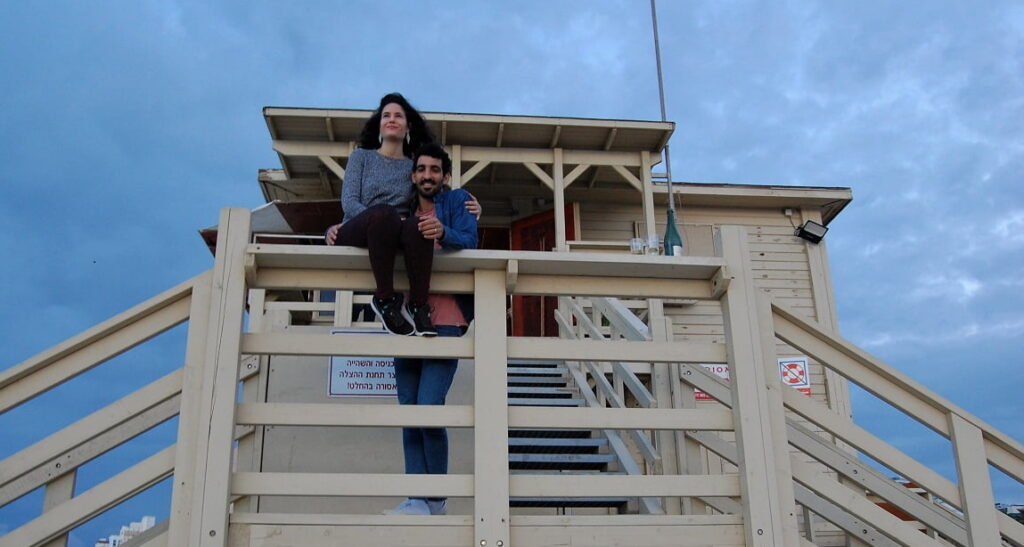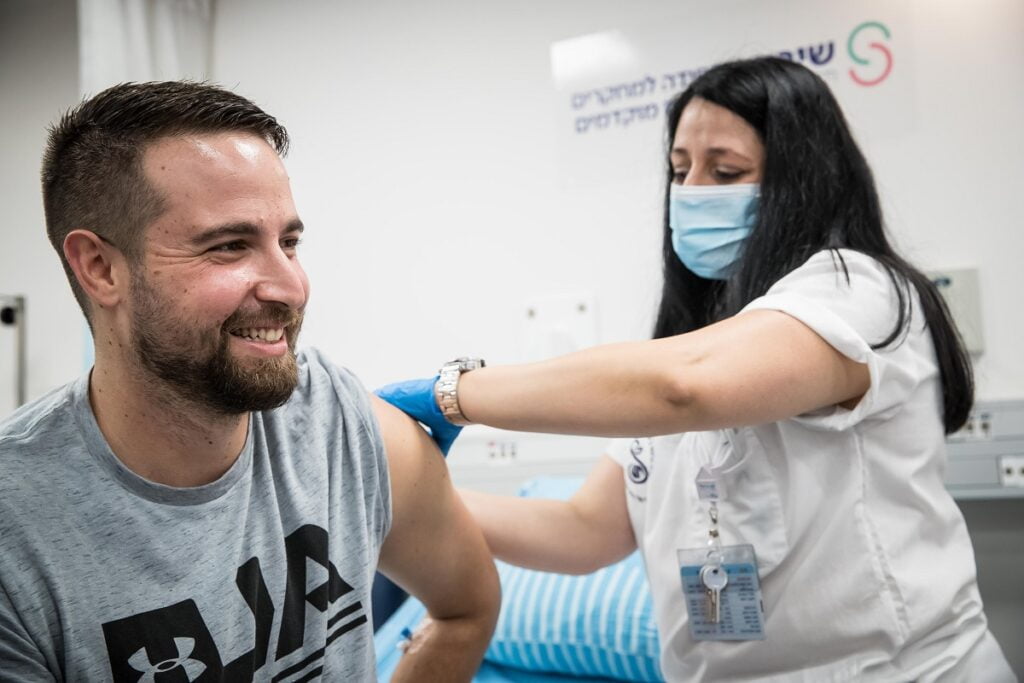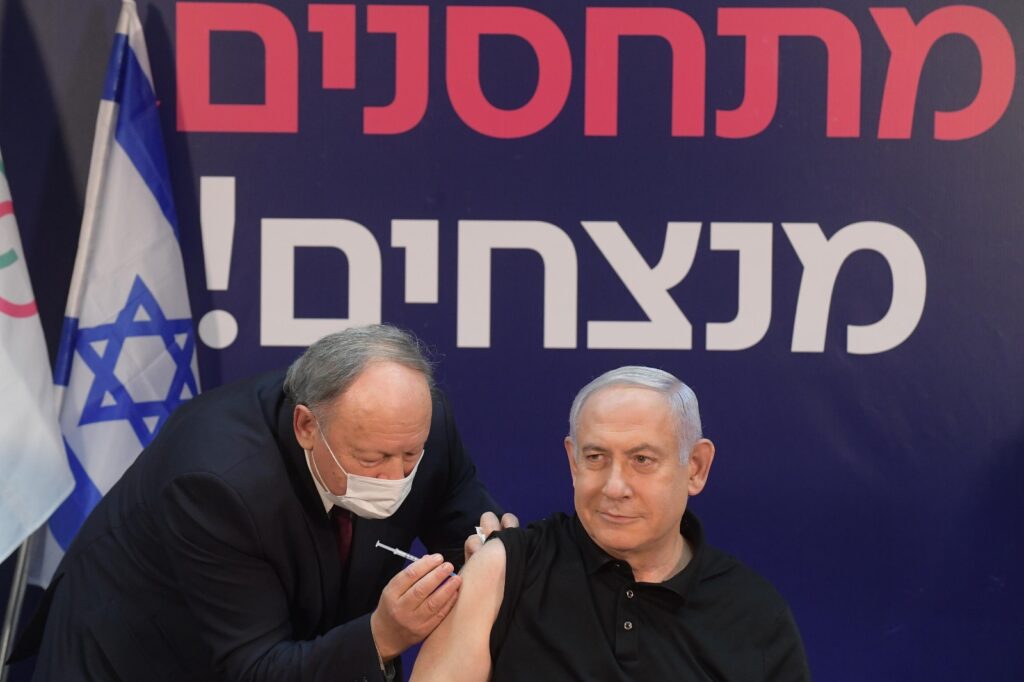The year 2020 is not one we will soon forget, as the COVID-19 pandemic made its way across the globe at blistering speed and caused devastating losses.
It’s been a long 12 months, but 2020 had some remarkable moments (and thankfully, 2021 is just around the corner).
In Israel, amid government restrictions that led to three nationwide lockdowns (one of which started this week,) Israelis danced on balconies and created fashion masks, saw Gal Gadot become Wonder Woman again, and normalized relations with the UAE, Bahrain, Sudan, and Morocco. They watched an Israeli rhythmic gymnast win the European Championships for the first time in history and an Israeli basketball player join the NBA. They gave out more COVID-19 vaccines per capita than any other country so far, with Israeli Prime Minister Benjamin Netanyahu receiving the first Pfizer jab.
Here are some of the big moments that made this year:
Balcony ‘parties’
The coronavirus outbreak hit Israel in early March, after sweeping through China and Europe. As schools and public venues closed, and gatherings were banned, Israelis looked for new ways to socialize and connect while they socially distanced and stayed at home.
Israelis took their cue from countries in Europe, creating a kind of social quarantine culture, screening movies against buildings, participating in games and workouts, dancing to live music, listening to serenades, and saluting health workers, all from their balcony window. In one especially memorable moment, residents from cities all over the country gathered on their balconies on the evening of March 19 to cheer for the medical professionals working tirelessly to combat the spread of COVID-19.
Symbols of the pandemic
Israelis were taken by surprise at the severity of the first lockdown in March and April. As unemployment soared to more than 18 percent at the time, the hardest hit were the small businesses that weren’t able to adapt to the restrictions that only allowed for shops and restaurants to make deliveries.

An Israeli falafel shop owner named Yuval Carmi became a symbol of the pandemic when he broke down in tears in an April television news segment. His heartbreaking story resonated with the whole country and strangers offered him monetary assistance.
Later, other restaurant and shop owners protested the lockdowns, breaking plates and contesting repeated fines. In one viral clip, a Tel Aviv shoe store owner shut down his store for good and emptied merchandise on the sidewalk for people passing by.
A rant about distance learning
Mom of four Shiri Kenigsberg Levi went viral in March with a rant on distance-learning in the first days after schools shuttered their gates. Levi hilariously skewered how parents, who aren’t used to being home all day with their children, were dealing with their new reality.
A teacher herself, she unleashed the indignation other parents were feeling toward teachers who they deemed are demanding too much. “If we don’t die of coronavirus, we’ll die of distance-learning,” she said in the hysterical outburst that was covered around the world.
If you haven’t seen it, here is her take:
Israeli athletes makes history
In March, Japan came to an agreement with the International Olympic Committee to postpone the Summer Olympic Games in Tokyo for one year due to coronavirus concerns. This was a heavy blow for Israeli athletes, who were going to be part of Israel’s largest delegation ever to the sporting event, including Israel’s first-ever baseball team and its star rhythmic gymnast, Linoy Ashram, who had won a bronze medal in the all-around at the 2019 World Championships.
In late 2020, Ashram became the first Israeli rhythmic gymnast in history to be crowned European Champion.
In other sports news, Israeli basketball fans rejoiced when Israeli-Serbian basketball player Deni Avdija was drafted into the NBA in December to play for the Washington Wizards. The Washington Wizards launched a Hebrew Twitter account for the occasion.
A driverless future with Mobileye
Israel’s self-driving tech giant Mobileye has had a big year around the world. The company’s CEO and co-founder Amnon Shashua announced two partnerships for the Jerusalem-based developer of driver assistance systems at CES 2020 back in January, saying that the firm would be preparing its self-driving vehicles for Korea and China.
In July, Mobileye announced it was set to test its self-driving vehicles in regular traffic in Germany. And this month, the company released a video showing its autonomous driving test vehicle navigating Munich’s road and highways. Mobileye also inked a deal with a UAE conglomerate to roll out a full Mobility-as-a-Service (Maas) offering in Dubai by 2023.
Mobileye is one of Israel’s most prominent tech companies. It was snapped up by US chipmaker Intel in 2017 for a cool $15.3 billion, Israel’s largest exit to date.
Making peace
The Mobileye deal might never have happened had Israel not ushered in new ties with the United Arab Emirates in August 2020. The US-brokered UAE-Israel normalization pact was called a breakthrough and an opportunity for peace, business, and hope.
The agreement was followed by news of cooperation deals between the two countries to target COVID-19, health, tech, investments, space solutions, and more. The first flight carrying Israeli tourists to the United Arab Emirates landed in the city of Dubai on Sunday, November 8.

The UAE and then Bahrain signed the Abraham Accords with Israel becoming the first and second Arab countries to reach a peace deal with Israel since Jordan in 1994. They were followed by Sudan in October and Morocco in December.
Israeli – UAE duet
Israeli singer Elkana Marziano, winner of Israel’s version of the reality show The Voice participated in a “historic moment” in September when he was chosen to sing a duet with UAE singer Waleed Aljasim in Arabic, Hebrew, and English called “Ahlan Bik,” or “Hello Friend.”
Sign up for our free weekly newsletter
SubscribeThe song was written by Doron Medalie, the songwriter behind Netta Barzilai’s Eurovision-winning hit Toy, and has since earned over 1.6 million views on YouTube. Both singers have also visited each other’s countries.
Shira Haas’s big night
Gal Gadot who? There’s enough room for more than one Israeli actress in Hollywood and Shira Haas could be the next big thing. While the talented actress is known for her role in Israeli television series Shtisel and had a bit part in the movie The Zookeeper’s Wife, her career really took off when she appeared in Netflix in the limited series Unorthodox about a Hasidic girl who runs away to Berlin to escape her religious upbringing and arranged marriage.
The popular series was nominated for eight Primetime Emmy Awards in various categories including a nomination for Haas for “outstanding lead actress.” While the Emmys weren’t live in Hollywood in September this year, due to the coronavirus pandemic, Haas appeared on the show virtually from a restaurant in Tel Aviv at 4am wearing a Chanel couture dress. Vogue did a feature about it.
While Unorthodox won for outstanding directing, Haas didn’t win her Emmy, but you can expect big things from the actress. She has already won acclaim for her role in the Israeli drama Asia at the Tribeca Film Festival.
Tel Aviv gets creative
As Israel emerged from its second lockdown in October, the Tel Aviv-Yafo municipality decided it would refuse to give up its cultural capital image, even if that meant organizing events whithin the strict COVID-19 guidelines.
In November, the city unveiled its “Tel Aviv-Yafo: The Non-Stop City Refuses To Stop” campaign to launch a winter season of performances and initiatives including hundreds of events every week across the city in compliance with Health Ministry restrictions.

Since the outbreak of the virus, Tel Aviv has leveraged its cultural atmosphere with unique events open to select residents in a socially distanced atmosphere. This summer, the city brought back a drive-in theater and announced the launch of Israel’s first “sail-in” floating cinema at the boating lake at Hayarkon Park.
The municipality also offered couples a lifeguard tower on the beach for a special date spot.

Massive beach cleanup
In late October thousands of Israelis participated in beach clean-ups across hundreds of locations along the country’s coastline on a Friday afternoon.
While many were specifically focused on an oil spill in Ashkelon that forced the Health Ministry to close the Ashkelon desalination plant, the operation spanned from Rosh Hanikra in the north to Ashkelon in the south to “influence decision-makers in three areas – establishing additional maritime reserves, forbidding people from bringing disposable dishes and utensils to beaches and enforcing laws protecting the beaches,” Haaretz reported.
‘We Got This’
Forty of Israel’s top singers and rappers came together to sing a song of strength and unity in the face of the novel coronavirus. “Ktan Aleinu,” loosely translated to mean “We Got This” was written by Liraz Russo, one half of popular Israeli pop duo Static and Ben-El, and songwriter and producer Yarden Peleg, also known as “Jordi.”
The tune was reminiscent of “We Are The World,” written by Michael Jackson and Lionel Richie and performed in 1985 by dozens of famous musicians who made up the supergroup USA For Africa.
The 40 Israeli singers spanned all ages, with names such as Gidi Gov, Gali Atari, Noa Kirel, and rapper Subliminal. Static wrote on his official Facebook page that “We Got This” is the most Israeli of sayings, representing how much Israelis have been through in their lives.
Vaccines in Israel
NoCamels kept up with the government-run Israel Institute for Biological Research (IIBR,) which, among other developments, found an antibody that neutralizes coronavirus and developed a vaccine for COVID. In October, IIBR got the okay to begin a clinical trial and the next month, 26-year old Segev Harel became the first Israeli volunteer to receive the inoculation.

Meanwhile, the Israeli government ordered vaccines from Moderna, AstraZeneca, and Pfizer/BioNtech — the latter of which is being used to vaccinate Israeli in the first stage of the inoculation drive.
Netanyahu was the first person to receive a COVID-19 vaccine almost two weeks ago and said the mass vaccinations could end the pandemic in Israel.

Israel is currently leading the vaccination race, with seven percent of the country already inoculated and more vaccine doses distributed per capita than any other country. To put it in perspective, the number of Israelis vaccinated against coronavirus has now surpassed the total number of Israelis infected with the illness.
Best of Twitter
In 2020, Twitter in Israel was dominated by three major themes: COVID-19, local politics, and the US elections. According to data collected by international PR firm GK from January to November 15 of this year, hashtags like #coronavirus and #stayhome had the highest growth this year while the most liked tweet (Hebrew) in Israel this year was sent out by MK Ifat Shasha Biton sharing her thoughts after Netanyahu fired her as Coronavirus Committee Chairperson.
The most retweeted tweet (Hebrew) in Israel was one by actor Yossi Zabari supporting the demonstrations at the Prime Minister’s official residence on Balfour Street, Jerusalem.
In spite of the challenging year, we are happy to report the most popular emoji used in Israel during 2020 was the laughing face, which was used more than any other emoji, according to GK.
We already know that the dystopian madness of this crisis also brought with it endless opportunities for memes and jokes.
Related posts

Rehabilitation Nation: Israeli Innovation On Road To Healing

Israeli High-Tech Sector 'Still Good' Despite Year Of War





Facebook comments